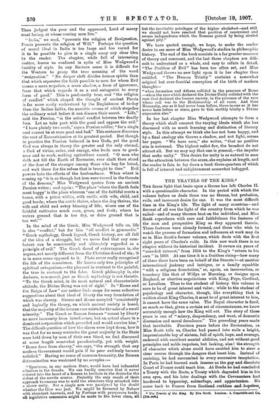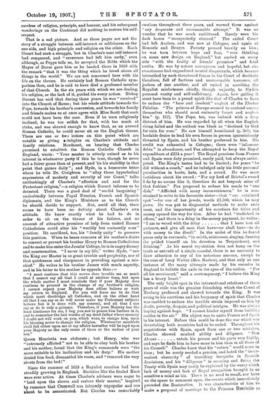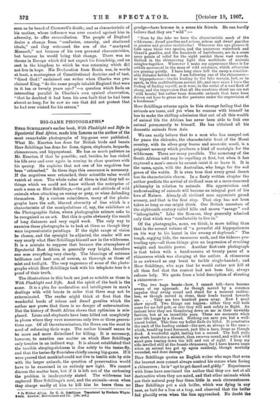THE TRAVELS, OF THE KING.*
THE fierce. light that beats upon a throne has left Charles II. with a questionable character. In the • period with which the volume -before us deals there was no throne; but probation, exile, and incessant desire for one. It was the most difficult time in the King's life. The light of many countries—and fiercest of all was the light of the country from which he was exiled—and of many thrones beat on the individual, and Miss Scott reproduces with care and faithfulness the features of the man and prospective King as they appeared therein. These features were already formed,and those who wish to wa.tch.the process of formation and influences at work may do so in Miss Scott's former volume, which deals with the first eight years of Charles's exile. In this new work there is no chapter without its-historical incident. It covers six years of "crowded interest," from 1654 to the King's "return to his own" in 1660. At one time it is a fruitless rising—how many of these there have been on behalf of the. Stuarts !—at another international jealousy and intrigue, or a family squabble "with a religious foundation," or, again, an insurrection, or treachery like that of Willys or Manning, or designs upon England, or abortive negotiations with King, Pope, Cardinal, or Levellers. .Thus to the student of history this volume is sure to be of great interest and value ; while to the student of psychology and character, though, like everything that is written about King Charles, it must be of great interest to him, it cannot have the same value. The Royal character is fixed, so much. so that,: given .a certain set of .circumstances, we know accurately enough how the King.will act. The story of these years is one of "misery, despondency, and want, of domestic discussion and moral decadence.' The preceding years made that inevitable. Fourteen years before the Restoration, as Miss Scott tells -us, Charles bad passed into, exile a bright, impressionable boy of sixteen, full of spirit, hope, and courage, endowed with excellent mental abilities, and not without good principles and noble impulses, but lacking, alas ! the strength of character which alone could have enabled him to steer a clear course through the dangers that beset him. Instead of resisting, he had .succumbed to every successive temptation. In Paris he had learned such lessons as the gay- and dissolute Court of France could teach him. At Breda he bad concluded a Treaty with the Scots, a Treaty which ..degraded him in' his own eyes, and his later dealings with the Covenanters :had hardened to hypocrisy, subterfuge, and -opizortunism. • He came back to France from Scotland reekless ..andhopeless.
'Th. Trawls of the King. By En Scott. London: A. Coastablepad CO. [1.54.4etra
careless of religion, principle, and honour, and his subsequent wanderings on the Continent did nothing to restore his self- respect.
That is a sad picture. And so these pages• are not the story of a struggle between self-interest or selfishness on the one side, and high principle and religion on the other. Each Stuart had such a struggle, but in Charles's case self-interest bad conquered, and "reverence had left him early," even although, as Pepys tells us, he accepted the Bible which the Mayor of Dover gave him as he landed there in 1660 with the remark "that it was the thing which he loved above all things in the world." We are not concerned here with his life on the throne. He certainly had Roman Catholic sym- pathies then, and he is said to have died a professed member of that Church. In the six years with which we are dealing, his religion, or the lack of it, guided his every action. Bishop Burnet has said that during these years he was "received" into the Church of Rome; but his whole attitude towards the Pope, towards his brother's conversion, and towards his family and friends makes us at once agree with Miss Scott that such could not have been the case. Even if he were religiously inclined, he was too selfish for that, with too much at stake, and was shrewd enough to know that, as an avowed Roman Catholic, he could never sit on the English throne.
There are one or twa letters on this point which are notable as giving a.delights on Charles's attitude and family relations. Mordatuat, on hearing that Charles promised to establish the Roman Catholic Church in England, wrote: "Your master is utterly ruined as to his interest in whatsoever party if this be true, though he never had a fairer game than at present, and 'tis his stability in that point that gaines daily "; and Hyde, in a humorous letter where he tells Dr. Creighton to "allay those hyperbolical expressions of modesty and severity of our Court," talks unblushingly of Charles's "affection and zeal for the Protestant religion,"—a religion which Burnet informs us he detested. There was a good deal of "sordid bargaining" undoubtedly between Papal Nuncios, French and Spanish diplomats, and the King's Ministers as to the Church he should decide to support. But, amid all that, there seems to have been no dubiety about Charles's own attitude. He knew exactly what he had to do in order to sit on the throne of his fathers, and no amount of attractive promises of help from united Roman Catholicism could alter his "worldly but eminently sane" position. He sacrificed, too, his "family unity" to preserve this position. When he hears rumours of his mother's desire to convert or pervert his brother Henry to Roman Catholicism and to make him enter the Jesuits' College, he is in angry dismay and consternation. "I never in my life," writes Hyde, "saw the King our Master in so great trouble and perplexity, nor of that quicknesse and sharpness° in providing against a mis- chief." He writes to his brother James with much asperity, and in his letter to his mother he appeals thus :—
"I must confess° that this newes does trouble me so much that I cannot say all that I could at another time, but upon the whole matter I must conclude that if your Majesty does continue to proceed in the change of my brother's religion, I cannot expect your Majesty does either believe or wish my return to England. For you will force me to do that which must disoblidge all Catholics, and on the other hand all that I can Bay or do will never make my Protestant subjects believe but it is done with my consent, and all that I can say or do is only a grimace. Therefore, if your Majesty has the least kindness° for me, I beg you not to presse him further in it, and to remember the last wordes of my dead father whose memory I doubt not will work on you, which were, to charge him, upon his blessing never to change his religion. Whatsoever mischiefe shall fall either upon me or my affairs hereafter will be layd upon your Majesty as the only cause of them or the undoer of your son."
Queen Henrietta was obdurate ; but Henry, who was "extremely afflicted" not to be able to obey both his brother
and his mother, found that the King's commands were "the more suitable to his inclination and his duty." His mother denied him food, dismantled his room, and "removed the very sheets from the bed!"
Since the summer of 1653 a Royalist reaction had been steadily growing in England. Societies like the Sealed Knot were ever active. At times Charles's advisers were eager to "land • upon the shores and restore their master," inspired by rumours that Cromwell was intensely unpopular and was about to be assassinated. But Charles was remarkably
cautions throughout these years, and warned them against
any desperate • and unreasonable attempt." It was no wonder that be was much embittered. Rarely were his dark hours "unexpectedly cheered." The exiled Court had left Aachen, and was now at Cologne, and again at Brussels and Bruges. Poverty pressed heavily on him; he was torn between hope and fear, "ever thinking on some new design on England," but curbed on every side "with the frailty of friends' promises" and fatal truths. He was by nature comag,eous and hopeful, but cir- cumstances had engendered mental disquietude; which became intensified by each threatened fracas in his Court of destitute Cavaliers, full of factions and unseasonable . humours, all jealous of one another, and all united in ascribing the Royalist misfortunes chiefly, though unjustly, to Hyde's personal vanity and self-sufficiency. Again, bow galling it must have been to a proud spirit like that of Charles to have to endure the "base and insolent" neglect of the Elector Palatine. "The princes of Europe seemed to contend amen-. themselves who should most eminently forget and neglect him" (p. 157). The Pope, too, was imbued with a, deep distrust of him: He was regarded by all when the English rising failed-and the outlook was black as "destined by God for ruin for ever." He saw himself humiliated (p. 308), his laudable desire to lead his own forces in person -ignominiously thwarted by Spain, and his brother preferred to him. His credit was exhausted in Cologne ; there were "infamous debts" in abundance, and Fox attempted to keep the Royal expenditure at £224 a year The Royal pensions from France and Spain were duly promised, rarely paid, but always antici- pated. The King's tastes had to be limited ; for years "he did without a coach," and he indulged only his little personal peculiarities in boots, hats, and a sword. He was most fastidious about his sword : "For my lord of Bristol's sword I do by no means like it, therefore do not bespeak mine of that fashion." Fox proposed to reduce his meals to "one dish." "Afflicted with many inconveniences," be is con- strained to write to his favourite sister—that "one untainted spot "—for one of her jewels, worth £1,500, whieh he may pawn. He was put to disgraceful methods to make ends meet, and the importunity of his courtiers for titles and money opened the way for him. After he had "trafficked in offices," and there is a delay in the money payment, he -writes : "I am so vexed with the delay that I have lost all patience, and give all men that have—or shall have—to do with money to the divell." In the midst of this he found peace only in carousals, "in mirth, mistresses, singing, dancing (he prided himself on his devotion to Terpsichore), and drinking." As his moral reptitation does not hang on the truth or untruth of a single scandal, there is no necessity to draw attention to any of his notorious amours, except to the case of Lucy Walter (Mrs. Barlow), and that only as one instance of the many attempts made by his enemies in England to belittle the exile in the eyes of the nation. "For all his merriment," said a contemporary, "I believe the King has a heavy heart."
The only bright spot in the international relations of these years of exile was the genuine friendship which the Count of Neuberg professed and showed towards the King. It was owing to his exertions and his buoyancy of spirit that Charles was enabled to endure the terrible strain imposed on him by doubt, poverty, despair, and political intrigue. He was always hoping against hope. "I cannot hinder myself from building castles in the air." His object was to unite France and Spain in his interest. Before this could be done the war which was devastating both countries had to be ended. Throughout his negotiations with Spain, apart from one or two mistakes, Charles showed marked ability and diligence. "Don Alone° extols his person and his parts very highly, and says he finds him to have more in him than in all those of his Council." Charles knew that his "return" would come in time ; but be sorely needed a pension, and hated the "incon- venient obscurity" of travelling incognito in Spanish dominions, and his " diligence " in securing and fixing the Treaty with Spain may easily be explained by the worry which lack of money and lack of Royal recognition brought to so sensitive a. mind as his. There is no need to recall, nor. have we the space to comment upon, the events which immediately preceded the Restoration. It was characteristic of him to make a proposal of marriage to the Princess Henriette as soon as he heard of Cromwell's death ; and as characteristic of his mother, whose influence was ever exerted against him in adversity, to offer reconciliation. The people of England desire a change from "confusion, anarchy, and shattered ideals," and they welcomed the son of the "martyred Monarch," not because of his own personal characteristics, but because he would bring that change. There was no throne in Europe which did not expect his friendship, and no sect in the kingdom to which he was returning which did not live in hope. His Declaration from Breda was, in words at least, a masterpiece of Constitutional doctrine and of tact. "Good God !" exclaimed one writer when Charles was pro- claimed King, "do the same people inhabit England that were in it ten or twenty years ago P "—a question which finds an interesting parallel in Charles's own cynical observation, " that he doubted it had been his own fault that he had been absent so long, for be saw no one that did not protest that he had ever wished for his return."












































 Previous page
Previous page